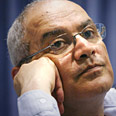
Halutz: Not calling up reserves was a mistake
A year after leaving post of IDF chief of staff, Dan Halutz speaks up; in exclusive interview, former military head admits to making mistakes in management of war in Lebanon, says IDF weakened because of its involvement in missions not purely military in nature for past 20 years
Former IDF chief of staff, Dan Haltuz, has kept his mouth shut since he resigned his post and made the transition to civilian life a year ago. For the first time, Haltuz opened himself up for questions to Yedioth Ahronoth in an interview published in its weekend edition.
"I read the (Winograd) report (on the Second Lebanon War) more than once," he said. "Fortunately, or perhaps unfortunately actually, I didn't find anything that I hadn't known. This is because the report is an endeavor that was carried out over a long period of time, based on investigations that we did in the military."
The retired general explained that "I expressed a sense of having missed (a target) when I questioned myself and I understood that it stemmed from unsatisfactory executions of my own and others around me. This is a hard feeling (to deal with) because you understand that you could have done things differently – and it didn't happen."
Halutz seeked to set the record straight on his leadership during the conflict in the summer of 2006 saying, "I never said – not as the chief of staff and definitely not during the Second Lebanon War – that the Air Force would decide the campaign. On the contrary, I was asked by the government what would be considered a victory, I told them that there wouldn't be a 'knockout.'
"The Israeli government is the commander of the military," he said. "I came to the government meeting, I presented what I had to say and we went out to carry them out only after they were approved. We didn't act even in the most inconsequential manner without approval from the political level."
He added that "no government minister will allow himself to be led to a place where he doesn't want to be. It's an oversimplification to say that I led 24 ministers by the nose. Who did I lead? The four (former) defense ministers that were there? Fuad (Binyamin Ben-Eliezer), (Shimon) Peres, (Shaul) Mofaz and (Amir) Peretz?"
Halutz also elaborated on the process through which Israel became engaged in the conflict with Hizbullah. "We immediately responded because the procedures and the commands mandate that certain steps be taken to attempt to stop the kidnapping. The commands in this context activate the Air Force and command-level firepower.
"At the same time, a process began within the general command as well as at the political level, at the end of which around midnight, resulted in the giving of approval for a wider operation," he said.
Mistake in timing of call-up
The former military chief offered a mea culpa saying that "I made a mistake in the timing of calling up the reserves. Even if there wasn't a need to activate them in the beginning, they should have been called up.
"It is true that I thought (the war) could have ended before (calling them up). The idea of using disproportional firepower in order for the other side to realize there is no sense in continuing was definitely there. And the other side definitely received disproportional firepower, but despite this, they continued on," Halutz said.
When Halutz was asked if he was surprised by the military's lack of preparedness, he responded by saying "I wasn't surprised by the problem, I was surprised by the potency of it. The IDF's state of preparedness didn't manifest itself by a lack of water of a lack of bullets. There is something deeper there that stems from, among other things, the fact that the IDF has been involved in missions that are not purely military ones for the past 20 years. Twenty years is a generation. The commanders of today were born into this reality."
Halutz also opened up about relations with his predecessor: "I don't forgive (former IDF Chief of Staff Moshe) Bugi Yaalon on two counts: for his lack of collegiality and for not speaking the truth. And for his accusation of corrupt spin: what maliciousness. How can is a former chief of staff able to utter such words?"
Halutz also had some words of caution for current military conundrums saying that "if one of the options is to take over Gaza, we need to know until when – and what the reason to withdrawn would be. Maybe, out of the chaos, we should also think about something else. For example, about speaking with the people in power over there."















